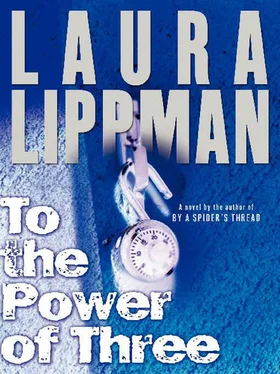They were eleven.They were in sixth grade, a much more innocent version of sixth grade. September 11 was literally unimaginable, except for those who were planning it. When 9/11 came in the fall of sophomore year, it turned out that one of those killed in the World Trade Towers was Dwight’s friend, the older boy who had thought their survey was so funny. He was a trainee at an investment firm, high in the second tower.
“I remember him,” Josie told Perri. “From the survey. He wanted to die in a plane crash. Remember, Dwight’s friend?”
(Actually, they knew by then that Dwight’s friend had been his supplier, that Dwight had run a thriving dope-dealing ring in Glendale all through high school, but it was not a topic that the candid Kahn family liked to discuss, now that Dwight had straightened out.)
Perri looked disgruntled at the mention of Dwight’s friend, perhaps because Josie was getting too close to the forbidden subject of Dwight’s pothead phase, or just because Josie was claiming a first-person connection that Perri considered her private property. It was a time of much weeping in Glendale High School, with girls erupting like geysers, and there was almost a competition of sorts, as unseemly as that might sound, to form connections to these events, at once so close and far. To speak of funerals attended and friends of friends of friends who had perished, to repeat stories of close calls-the local family that had almost flown out of Dulles that day, the cousins who lived mere miles from where the one jet crash-landed in Pennsylvania.
“Well,” Perri said. “He got his wish.”
PART THREE. Falling In Love With Jesus
Sunday
14
Lenhardt lay in bed,listening to his family get ready for church. Week in, week out, it was one of his best moments-alone yet not alone, the sounds of his wife and children drifting up to him from the downstairs rooms. The chatter was sharp at times; getting two children to church was seldom a smooth process and even required taking the Lord’s name in vain a time or two.
But, overall, it was a comforting, lulling murmur. On winter Sundays, Lenhardt exulted in the warmth that Marcia left behind, rolling into her spot, picking up her scent, very clean and soapy. On a warm June morning such as this one, he kicked off the lightweight blanket and stuck a leg outside the sheet, a thermal balancing act he had learned from his first wife. That had been a young marriage, a starter marriage, the kind of mistake that only two twenty-two-year-olds can make. The divorce had been more like a breakup, with record albums to be divided-and not much more. Except, sadly, an infant daughter. Lenhardt had paid his support dutifully for eighteen years, but his wife moved to Oregon and remarried before the girl, Tally, was two. She thought of her stepfather as her daddy, and maybe he was. To this day Lenhardt sent checks on Christmases and birthdays, but nothing ever came back, not so much as a postcard.
The hallway floorboards creaked, a sound signaling a child’s excessive, overdone caution, and Lenhardt cracked an eye as the bedroom door whined open. Jessica’s pillow was just about to land on his head when he snaked his arm to the left, grabbed Marcia’s abandoned pillow, and thwacked his daughter softly on the back.
“Got you first!” Jessica crowed, doing an up-and-down victory dance.
“But you can’t get me now,” he said, taking her wrists in his and pulling her onto the bed. He began tickling her, and although Jessica managed to free a hand, she was helpless to defend herself. She writhed and giggled, quite out of breath.
“Jessica-” Marcia’s tone was even, but Lenhardt recognized she was near her breaking point. “You just brushed your hair. Now it has to be brushed all over again.”
“No.” The girl took refuge behind her father. “I’ll do it myself.”
“Okay, but quickly. We need to leave in five minutes. Besides, you’re supposed to let your father sleep on Sundays. It’s his only day to sleep in.”
“I’ve been thinking about that,” Jessica said, tucking her legs beneath her and making no move to reach for the hairbrush that Marcia was now extending toward her. “Why can’t Daddy sleep in on Saturdays the way the rest of us do when there’s no swim meet?”
“Daddy worked yesterday,” her father pointed out. “In fact, Daddy’s going to work today .”
“I mean, when you don’t have to work. Why don’t you go to church with us?”
“Well, I have chores, and things to fix.”
“Why can’t you do your chores later?” she persisted.
“Jessica, get out of that bed and brush your hair, or I’ll use this on your bottom instead.”
The girl rolled her eyes, knowing that neither parent would ever raise a hand to her. But she did as her mother said, although she managed to do it in a way that indicated it was a mere courtesy to two inferior beings. Lenhardt slid out of the bed after her and headed into the shower, marveling again at his daughter’s bullshit detector. Jason was two years older, but he had never questioned Lenhardt’s absence from church. Jessica had an instinct for stories that didn’t quite hang together. Maybe it was a genetic thing.
Lenhardt had given his wife’s Methodist church a try, but he had never felt comfortable in the generous, light-filled space that Marcia called a church. Old habits died hard. He said “trespasses” instead of “debts” during the Lord’s Prayer, started to cross himself, and while his knees didn’t miss the literal ups and downs of the Catholic mass, his heart did, a little. “Church” should be one of those tall, gloomy piles that made you feel guilty as soon as you were over the threshold. No, he was just too old a dog to learn new tricks. So Marcia allowed him to abstain, as long as he promised to show up for the big things and didn’t expose the kids to his own doubts about the whole enterprise.
Well, he was working today, that wasn’t a lie. Less than fifteen minutes after his family headed out to church, he was en route to the Glendale address that the gun registration had kicked back for Michael Delacorte. Somewhat to his surprise, Glendale wasn’t that far from his own house, a quick detour off I-83. He had always thought of that rich suburb as a world away. But then, there were no true neighborhoods out here in north county, not like in the city, just one development running into another, sort of like what happened when Jessica tried to make cookies. Lenhardt had grown up in Remington, a lower-middle-class enclave best known for its rat problem. Word had it that Remington was getting semidesirable these days. And why not? It was good housing stock, brick and stone, ten minutes to downtown. People were tired of driving so much, in Lenhardt’s opinion. He wouldn’t have moved out here if he hadn’t landed the job in the county. There was a guy down at the University of Maryland who released a study, year after year, showing that commuting was the single biggest waste of Americans’ time.
“What about books on tape?” Infante had asked whenever Lenhardt cited this study, trying to play devil’s advocate. “You could learn, like, lots of stuff.”
“Such as?”
“Civil War battles. Or art history, like they have in that one book everyone’s reading now. Or you could read the classics you didn’t read in school.”
“I read The Great Gatsby when Marcia was doing it for book club,” Lenhardt said. “Green light, big thrill.”
Once in Glendaleit took him a few wrong turns to find the place he wanted, Windsor Park. Like most of the developments out here, it was set on a series of loops, with loops coming off the loops, so it was easy to get lost. The planners probably thought this layout discouraged burglars and thieves, and they would have been right, if communities such as this were targeted by the usual schmo amateurs, the addicts and teenagers interested in a quick buck or a joyride. But a pro wouldn’t be deterred by Windsor Park ’s layout. A real thief would study it, driving the streets in the bland white van of a contractor, figuring out when people came and went, who had dogs, what drew attention. Such a guy might even take a job as a workman, given the endless renovations and remodelings, which would afford him the chance to find out who had alarms-and who set them. You’d be surprised how many people didn’t use their expensive alarm systems because they didn’t want to turn the bypass code over to the maid, or some nonsense like that. The smarter thieves cut phone wires, waited to see if anything happened-some homes had cellular backup, but not many-and then went in with a pillowcase.
Читать дальше












